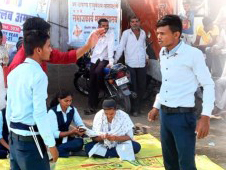In April 2020, the body of 10-year-old Sudarshan Rathod from Budruk, a small village near Amalner in Maharashtra, was found near a deserted lake. He was a victim of a human sacrifice ritual which was performed by a family to restore the deteriorating health condition of their son who is of the same age as Sudarshan. This case came to light after the district court ordered the police to file a complaint against the culprit under the Maharashtra Prevention and Eradication of Human Sacrifice and other Evil Practices Act, 2013. Sixteen people were arrested and a trial is underway. Post the incident RC Amalner, RID 3030, along with its RCC and students from SSES Pandit Jawaharlal Nehru College have started an anti-black magic campaign.

“This is 21st century and yet many people, not just from rural but urban regions too, consult tantrik, Pir Baba (godmen) or an astrologer to find a cure for their illnesses instead of approaching a doctor. This is not the only case in Amalner, where people have lost money, property and life because of this stupidity. Through our awareness programmes we want to drive home the message that black magic is prohibited in law and people doing such weird things are cheating the gullible with coloured threads and powders,” says Dr Bharat Khandagale, professor of social work at SSES College, who is training his students to enact street plays as part of the awareness initiative.
Not all superstition can be addressed by law. Only awareness initiatives can deter people from approaching fraudulent godmen or practising inhuman rituals behind closed doors, says club’s IPP Abhijeet Bhandarkar, adding that superstitious practices are dehumanising and exploitative, hence need to be dealt with stringently.
There are 155 villages around Amalner and “the lack of education is a major cause for people’s belief in black magic,” says Mauli Patel, a student of SSES College and a street play artist. As students of social work, Patel and his friends, a team of 15 students, are mounting an energetic campaign to educate villagers against such practices. They have so far conducted programmes in 25 villages and plan to visit more rural areas to expand this initiative.
They have come across fraudulent godmen who had cheated the villagers and disappeared with their money or killed innocent persons in the name of nar bali with the avowed purpose of restoring health or wealth. Apart from street plays, they distribute handbills and display posters and banners against black magic and weird actions prohibited under law.
Bhandarkar points out that creating awareness against aghori practices is not easy. “For most people this is like questioning their belief system. So, our RCC members are vigilant and ensure the safety of the students.” The club bears the travel, logistics expenses of the students, besides funding their banners and handbills.





